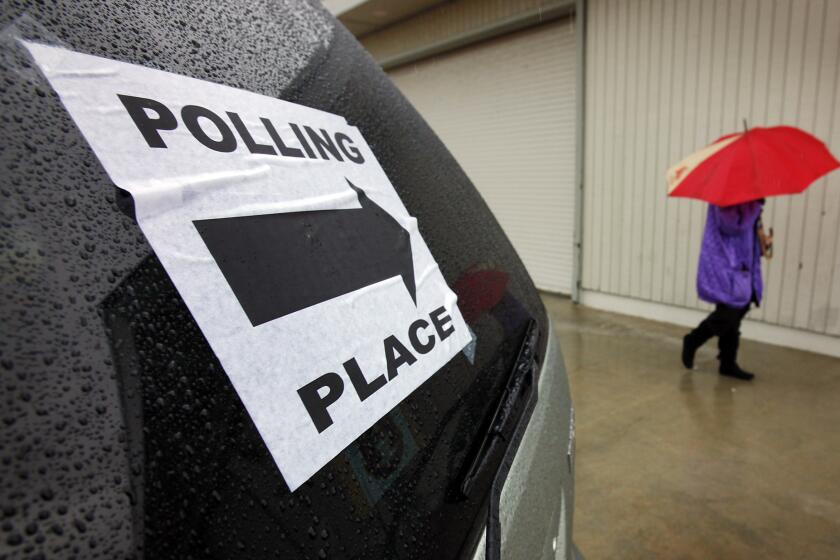Flap over Dianne Feinstein lecturing children in viral video underscores Democrats’ split on ‘Green New Deal’
Reporting from Washington — Sen. Dianne Feinstein’s debate with a group of school children over climate change policy, captured in a video that went viral late Friday, underscored tensions brewing within the Democratic Party between its restive liberal activists and more moderate, pragmatic elected officials.
While Democrats are united that man-made climate change must be addressed, how aggressively to do so — and how to pay for it — is an increasingly contentious matter, especially as the wide-open competition for the party’s 2020 presidential nomination has gotten underway.
The left is invigorated by Democrats’ sweeping wins in 2018, yet moderates remain mindful of Republicans’ hold on the Senate and White House, and the challenge of dislodging President Trump, who, more than ever, has led his party to side with climate-deniers.
Assailed by many on social media after the video circulated, Feinstein in a statement described the interaction at her San Francisco office with about a dozen middle- and high-school students and several young adults as a “spirited discussion” and said that “they were heard loud and clear.”
Varshini Prakash, executive director of the group that sponsored the visit, the Sunrise Movement, said in a statement that the incident shows a need for fundamental change in the Democratic Party.
“Leaders like Feinstein are out of-touch with the center of energy in the party, which is with the grassroots movement for a Green New Deal,” she tweeted.
Online reaction to the 2-minute, 20-second video was divided. Some watchers criticized Feinstein as condescending, and dismissive of an ambitious idea just because it won’t pass the Republican-controlled Senate. Others argued that she was firm yet polite in trying to explain the political realities of Washington to the children, and that the video was edited to make her look as bad as possible.
A full version of the 15-minute interaction was also posted on the Sunrise Movement’s Facebook page. In it, Feinstein acknowledges that she might vote for a pending resolution for the so-called Green New Deal, despite her opposition to its far-reaching implications and costs. She also distributes copies of her alternative environmental proposal and agrees to give a 16-year-old girl an internship in her office some day.
Progressive strategist Eric Schmeltzer said on Twitter that Feinstein should apologize for getting “snippy” with the kids and criticized her as too pragmatic on the issue in general. Yet he added that the meeting overall appeared to go well.
“I was initially furious and ready to jump all over DiFi based on the edited video, and felt duped when I saw the longer one,” Schmeltzer said, using a common nickname for the senator. “I won’t trust Sunrise content at face value anymore, as a result.”
More broadly, the video, and how quickly it became viral and ignited debate, highlights how the Green New Deal issue could become divisive for Democrats.
In the House, Speaker Nancy Pelosi (D-San Francisco) has created a select committee on addressing climate change, including several new House members who support bold action. But activists complain that it does not have the power to propose legislation nor can it issue subpoenas. Any legislation would have to come through the normal committee structure, and Pelosi has cast the Green New Deal as just one among many proposals the House will consider.
Senate Republicans already have been seeking to put Democrats in a tough position on the proposal, which was introduced by freshman Rep. Alexandria Ocasio-Cortez of New York, a self-described democratic socialist, by scheduling a vote on it as soon as next week.
The proposal would not become law; it is a resolution to put Congress on the record in favor of overhauling the U.S. energy system from predominantly fossil fuels to run on 100% renewable energy by 2030. The broad statement of ideals includes few details of how that should happen or how it would be paid for. Only about a dozen Senate Democrats have said they will support it; activists such as the Sunrise Movement have been pressuring other Democrats for weeks. All 47 Senate Democrats as well as 13 Republicans would have to support it for the resolution to pass.
“That resolution will not pass the Senate, and you can take that back to whoever sent you here and tell them,” Feinstein told the children. “It doesn’t have a single Republican vote, and Republicans control the United States Senate.”
She added, “I’ve been in the Senate for over a quarter of a century, and I know what can pass and I know what can’t pass.”
For longtime watchers of Feinstein’s career, the scene was not a surprise. She’s known for promoting pragmatic compromises to get things done. And in recent years, she has reacted bluntly to demanding activists, especially when they insinuate that she isn’t doing enough.
When a protester shouted at the senator in 2017 that she should take a stand and automatically oppose Trump’s nomination of Neil M. Gorsuch to the Supreme Court rather than examine his record first, Feinstein responded coolly: “Young man, I’ve made more stands in my lifetime than you are old, by far.”
Feinstein hasn’t been a stranger to addressing climate change, though her proposals have been more pragmatic than some on the left call for.
In 2007, she led the successful fight to raise vehicle fuel-economy standards by at least 10 miles per gallon over 10 years. Her alternative to the Green New Deal calls for a longer timeline in reducing carbon emissions. In giving the students copies, she told them it was “thoughtfully worked out” by experts and had a better chance of passing.
“I’m trying to do the best I can, which was to write a responsible resolution,” Feinstein said. One young woman told her that is not good enough.
“You know better than I do, so I think one day you should run for the Senate and, then, you do it your way,” Feinstein said.
“Great,” the woman replied. “I will.”
More stories from Sarah D. Wire »
More to Read
Get the L.A. Times Politics newsletter
Deeply reported insights into legislation, politics and policy from Sacramento, Washington and beyond. In your inbox three times per week.
You may occasionally receive promotional content from the Los Angeles Times.











